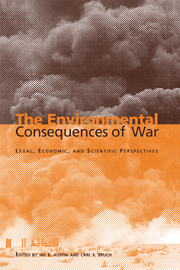Book contents
- Frontmatter
- Contents
- List of illustrations
- List of tables
- List of contributors
- Acknowledgements
- Foreword by Klaus Toepfer
- Introduction
- Part I General principles
- Part II The legal framework
- Part III Assessing the impacts – scientific methods and issues
- Part IV Valuing the impacts – economic methods and issues
- Part V Prospects for the future
- Introduction
- 22 Protecting specially important areas during international armed conflict: a critique of the IUCN Draft Convention on the Prohibition of Hostile Military Activities in Protected Areas
- 23 The Chemical Weapons Convention: a verification and enforcement model for determining legal responsibility for environmental harm caused by war
- 24 International legal mechanisms for determining liability for environmental damage under international humanitarian law
- 25 Waging war against the world: the need to move from war crimes to environmental crimes
- Epilogue
- Index
Epilogue
Published online by Cambridge University Press: 04 August 2010
- Frontmatter
- Contents
- List of illustrations
- List of tables
- List of contributors
- Acknowledgements
- Foreword by Klaus Toepfer
- Introduction
- Part I General principles
- Part II The legal framework
- Part III Assessing the impacts – scientific methods and issues
- Part IV Valuing the impacts – economic methods and issues
- Part V Prospects for the future
- Introduction
- 22 Protecting specially important areas during international armed conflict: a critique of the IUCN Draft Convention on the Prohibition of Hostile Military Activities in Protected Areas
- 23 The Chemical Weapons Convention: a verification and enforcement model for determining legal responsibility for environmental harm caused by war
- 24 International legal mechanisms for determining liability for environmental damage under international humanitarian law
- 25 Waging war against the world: the need to move from war crimes to environmental crimes
- Epilogue
- Index
Summary
This volume has highlighted ways in which the community of nations has sought to limit and redress wartime environmental damage. Over the past few decades, great strides have been made in developing the relevant legal norms, as well as the necessary scientific and economic tools; and international institutions capable of investigating and enforcing these provisions are emerging. The history of the law of war thus far has been a matter of incremental development in response to the horrors of previous conflicts. This patchwork quilt of legal prescriptions and institutions suffers from a wide variety of unresolved issues related to preventing, assessing, remediating, and determining responsibility and liability for environmental damage from armed conflict. The controversy over the 1999 Kosovo conflict, including the decision of the International Court of Justice, highlights many of these gaps and presents a number of challenges for the international community. Further, it raises questions of how well the existing legal framework and institutions can adapt to new advances in high-technology warfare.
The Kosovo situation implicates the most serious crimes against humanity: genocide and ethnic cleansing. This Epilogue focuses on a small subset of issues, specifically the environmental consequences of the conflict. It does not attempt to weigh these environmental consequences against the humanitarian imperatives motivating the NATO action. At the same time, even if the reasons for going to war are just and legal, the law of war requires separate consideration of the conduct of the war.
- Type
- Chapter
- Information
- The Environmental Consequences of WarLegal, Economic, and Scientific Perspectives, pp. 647 - 664Publisher: Cambridge University PressPrint publication year: 2000
- 2
- Cited by



